This morning, feeling busy and harassed (and distracted by the poetry reading at 4 p.m.), I thought I’d phone it in with a 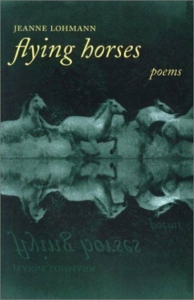 favorite poem by Jeanne Lohmann (1923-2016). Instead I found myself rereading all of her 2001 book, Flying Horses (Fithian Press).
favorite poem by Jeanne Lohmann (1923-2016). Instead I found myself rereading all of her 2001 book, Flying Horses (Fithian Press).
She Who Travels Alone
No, not in Bristol or in Galway will I find him,
not Minneapolis or Sioux City. Though I am brave
and go as far as Antarctica, he does not
ride the ice floes or swim under frozen water.
He does not live with sheep in the Midlands
or walk the abandoned cloister. He
is not to be found on the benches in pubs
or the next seat at the theater. His shadow
does not hang on a thornbush or darken
the lost emerald lake in British Columbia.
The greenest of fields in Africa will not revive him,
or castanets in cantinas south of the border. He
does not rake stones in the Japanese garden,
sit silent and patient with open eyes in the zendo.
He does not lift luggage into the car or insist
on the open window. Though I am a tireless traveler
I cannot search out his face or bring him to bed.
The last kiss was goodbye, God be with you
most trusting and hopeful of prayers
for each restless departure,
each solitary coming home.
—Jeanne Lohmann
This is a book that I reread every so often. I love her praise poems and have several copied out in my commonplace book. But each time I read Flying Horses I’m caught by a different theme, or one poem I’ve overlooked leaps out at me. Today I’ve noticed how Lohmann plays with language, and draws other poets and writers into her poems–Dickinson and Whitman, John Donne, and D. H. Lawrence, Shakespeare, Edna St. Vincent Millay.
Sea Song Out of Beowulf
Dree me to nim the swan-road, breast-hoard, suffer me
to hole the sea’s storehouse, thole and take hold
of the bone-house, body-box, dree the skeleton store,
all the way suffer and endure the body walking light on the sea,
the body walking and the swan-road a-sheen, the body’s trunk
walking on the sea shining. Thole the breast-hoard,
nim the bone-house, seize the body-box, suffer
the store of thoughts and feelings home to the sea,
dree the skeleton all the way to the sea, the swan-road a-sheen
in the morning, the sea shining and singing in the morning.
—Jeanne Lohmann
I have been struggling with creating a new manuscript of poems, daunted at the task of choosing a smaller number of poems out of the cacaphonous 120 or so in my notebook and calling it “whole.” But Flying Horses takes numerous motifs—horses, the death of her parents and friends and especially of her husband, births of children, travels, all she is reading—and weaves them into a tapestry. (One poem, “Across the Warp,” seems to speak deliberately to this: “This rough underside, this is where we work / against the threads’ resistance, the tangled / colors.”)
Lohmann is often identified as a Quaker poet, and in many of these poems the spirit is present, shimmering. In a late poem, “Wasp in the House,” she writes about the trick of catching the wasp in a drinking-glass. She concludes: “As when tired of words / and the world, I am able to befriend / some small humming complexity / and let it go.”
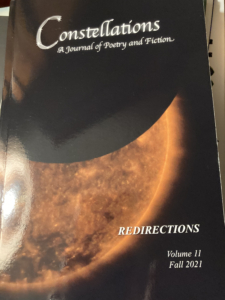

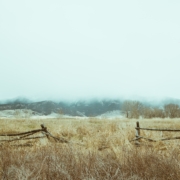
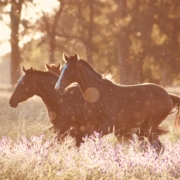
 favorite poem by
favorite poem by 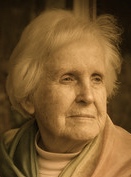 that she recently died. I don’t know whether to be sad or to rejoice that the world got to share this woman’s light for such a long time.
that she recently died. I don’t know whether to be sad or to rejoice that the world got to share this woman’s light for such a long time.